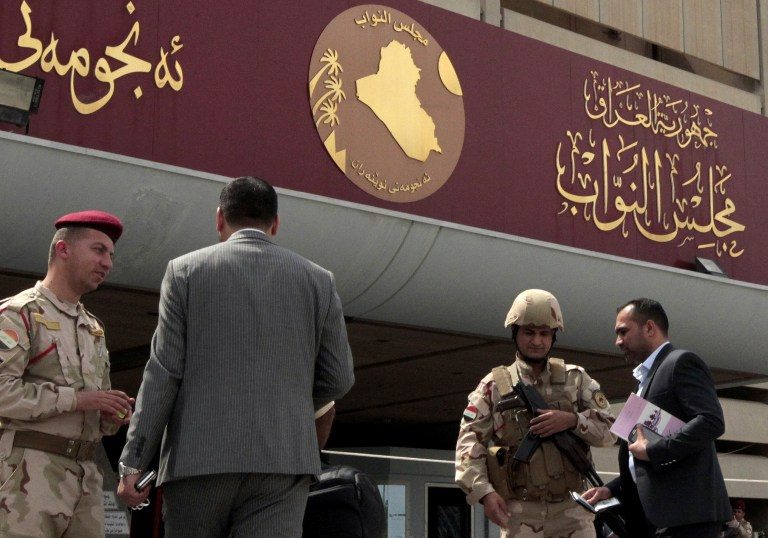SUMMARY
This is AI generated summarization, which may have errors. For context, always refer to the full article.

BAGHDAD, Iraq – An emergency session of Iraq’s parliament descended into chaos on Wednesday, April 13, preventing a vote on a new cabinet amid a row over political blocs controlling key government posts.
Lawmakers argued and hurled water bottles at each other in the parliament hall, forcing a recess, MPs told Agence France-Presse.
The political row comes at a critical time for Iraq, which is battling to regain more territory from the Islamic State (ISIS) jihadist group, and Washington has expressed concern that the cabinet dispute could distract from that fight.
Iraq is also struggling with a major financial crisis caused by low oil prices combined with inefficiency and corruption, and US Secretary of Defence Ashton Carter plans to discuss Gulf states providing economic aid to Iraq during an upcoming trip to the region.
Dozens of lawmakers held an overnight sit-in at parliament to protest efforts by influential political blocs to maintain control of ministries, prompting speaker Salim al-Juburi to convene Wednesday’s session.
Prime Minister Haider al-Abadi, who wants the cabinet to include technocrats instead of party-affiliated ministers, presented a list of nominees at the end of March.
But the blocs put forward their own candidates and most of Abadi’s were replaced on a second list distributed to lawmakers on Tuesday, April 12.
Some MPs demanded the opportunity to vote on Abadi’s original list – from which at least two candidates had already withdrawn – but the session was adjourned Tuesday without a vote on either the old or the new lists.
Angry scenes continued on Wednesday when MPs threw water bottles and shouted at each other, two lawmakers said.
Earlier in the day, an Agence France-Presse journalist saw around 80 members of parliament taking part in a sit-in inside the parliament hall, some of whom chanted: “Yes yes to reform, no no to (political) quotas!”
Thin mattresses on which lawmakers slept were spread outside the entrance to the hall.
‘Discrediting Abadi’
“More than 50 MPs from all the political blocs” took part in the overnight sit-in, said lawmaker Iskander Witwit.
All of this is bad news for Abadi, who has already been repeatedly criticized as being a weak premier.
“This circus in parliament was led by Maliki surrogates, so of course this was just theatre,” said Kirk Sowell, a Jordan-based political risk analyst who is the publisher of Inside Iraqi Politics, referring to supporters of Abadi’s predecessor Nuri al-Maliki.
“Undermining, further discrediting Abadi, and Juburi for working with him, was the goal. And in that regard they’ve had some success,” Sowell said.
Iraqi ministries have for years been shared out between powerful political parties that run them as their personal fiefdoms, relying on them for patronage and funds.
But even if the current cabinet line-up is replaced with independent, technocratic ministers – a change that faces major obstacles – that would only be the beginning of the process.
Ministries are packed with lower-level employees appointed on the basis of party and sectarian affiliation, and replacing them would face serious resistance.
Technocratic ministers would also lack the political cover afforded by party affiliation, and could face threats by armed groups opposed to changes they proposed.
Abadi called in February for “fundamental” change to the cabinet so that it includes “professional and technocratic figures and academics”.
That kicked off the latest chapter in a months-long saga of Abadi proposing various reforms that parties and politicians with interests in the existing system have sought to delay or undermine.
Powerful Shiite cleric Moqtada al-Sadr later took up the demand for a technocratic government, organizing a two-week sit-in that put Abadi under pressure to act, but also supported the course of action he wanted to take.
Sadr relented after Abadi presented his first list of nominees at the end of March, but has yet to react to the most recent developments in efforts to replace the cabinet. – Salam Faraj, AFP / Rappler.com
Add a comment
How does this make you feel?
There are no comments yet. Add your comment to start the conversation.